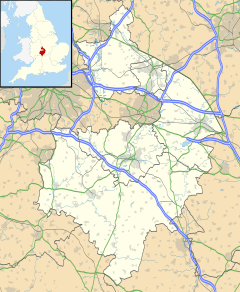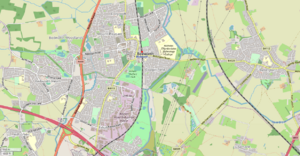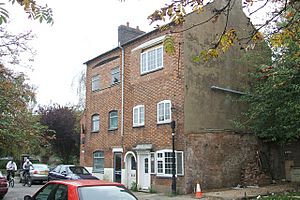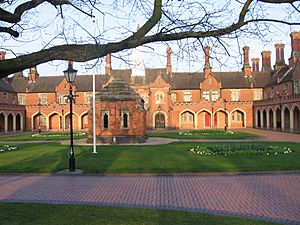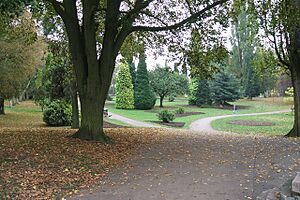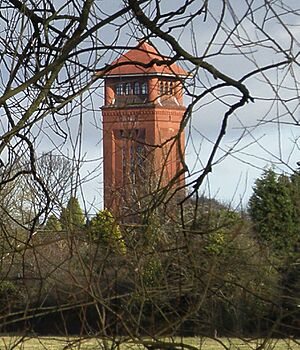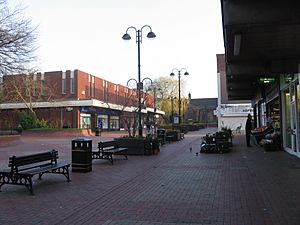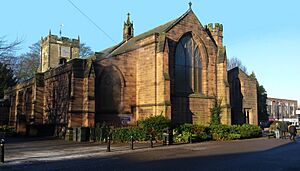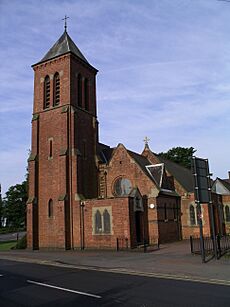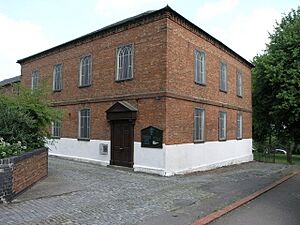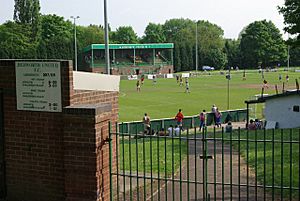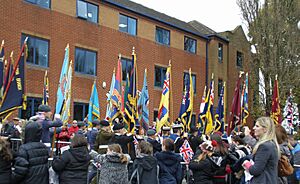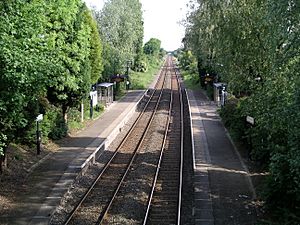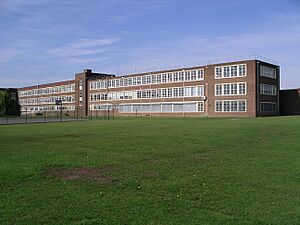Bedworth facts for kids
Quick facts for kids Bedworth |
|
|---|---|
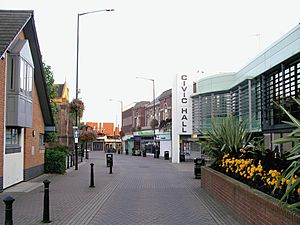 Bedworth High Street and Civic Hall |
|
| Population | 31,090 (2021 census) |
| OS grid reference | SP3586 |
| District |
|
| Shire county | |
| Region | |
| Country | England |
| Sovereign state | United Kingdom |
| Post town | BEDWORTH |
| Postcode district | CV12 |
| Dialling code | 024 |
| EU Parliament | West Midlands |
| UK Parliament |
|
Bedworth is a lively market town in Warwickshire, England. It's located between the bigger cities of Coventry (about 6 miles south) and Nuneaton (about 3 miles north). In 2021, around 31,090 people called Bedworth home. People often say its name as 'Beduth', but 'Bedworth' is also common.
Contents
Where is Bedworth?
Bedworth is about 101 miles northwest of London. It's also 19 miles east of Birmingham and 17 miles north of Warwick, the county town.
Bedworth's Neighborhoods
The town has six main areas. These are Collycroft, Mount Pleasant, Bedworth Heath, Coalpit Field, Goodyers End and Exhall. Exhall is a general name for the area near junction 3 of the M6 motorway. It includes parts of both Bedworth and Coventry.
Nearby Villages and Rivers
About 1.5 miles east of Bedworth is the village of Bulkington. The village of Ash Green is about 2 miles to the south-west. Bedworth is very close to Coventry. It is considered part of the Coventry and Bedworth Urban Area. The River Sowe starts in Bedworth. It flows through Exhall and Coventry. Then it joins the River Avon further south.
Bedworth's History
Bedworth started as a small market town. It has roots from the Anglo-Saxons. The town was first mentioned in the Domesday Book in 1086. Back then, it was called Bedeword.
Early Times and Challenges
The first record of a priest in Bedworth was in 1297. The town faced hard times during the Black Death in the 1300s. By 1590, only 14 families lived there. But by 1730, Bedworth began to grow again. This was thanks to local coal mining. At that time, it had about 260 houses.
A Place for Nonconformists
In 1665, a law called the Five Mile Act 1665 was passed. It stopped certain church groups, called Nonconformists, from meeting near big towns like Coventry. Bedworth was exactly five miles from Coventry. This made it a safe place for Nonconformists to gather. In 1686, Reverend Julius Saunders started the Old Meeting congregation there. A Presbyterian chapel was built in 1726. It is now part of the United Reformed Church and still stands today.
Industrial Growth and Change
Bedworth became an industrial town in the 1700s and 1800s. This was mainly due to coal mining and the ribbon weaving industry. Coal mining had been happening since the 1200s. But it grew a lot during the Industrial Revolution. The industry was biggest in 1939. There were 20 coal mines in the area. The last mine in Bedworth closed in 1982.
French immigrants called Huguenots brought ribbon weaving to the area in the 1700s. This industry did very well for almost 100 years. But it was badly hit in the 1860s. This happened when new trade agreements made French silks cheaper. However, Hat making then grew. It replaced the ribbon trade and lasted until the 1950s.
Better Transport Links
New transport links helped the town grow even more. The Coventry Canal opened in 1789. Later, the Coventry to Nuneaton railway opened in 1850. More recently, the M6 motorway opened just south of the town in 1971.
Local Government Changes
From 1894, Bedworth was a civil parish. In 1928, it became its own urban district. Over the years, it grew by adding nearby areas like Exhall and Bulkington. In 1974, the Bedworth Urban District joined with Nuneaton. Together, they formed the borough of Nuneaton and Bedworth.
What to See in Bedworth
Bedworth has some interesting buildings and places.
Nicholas Chamberlaine Almshouses
One of the most famous buildings is the Nicholas Chamberlaine Almshouses. They are in All Saints' Square. These buildings look like old Tudor houses and were built in 1840. They replaced older buildings. A local helper named Nicholas Chamberlaine (1632–1715) paid for them in his will. The almshouses were fixed up in the 1980s. They are now a special listed building.
Town Centre and Civic Hall
Most of the town centre was rebuilt in the 1960s and early 1970s. It has a shopping area where cars are not allowed. You can find well-known shops there, along with charity shops and banks. The main place for events in Bedworth is the Bedworth Civic Hall. It opened in 1973 in the town centre. It also has an arts centre.
Miners' Welfare Park
South of the town centre is the Miners' Welfare Park. It opened in 1923. It was first made for miners and their families to relax. Now, the local council manages it. It has sports fields, paths, and gardens. A new play area opened in 2012. It was named after Sergeant Simon 'Val' Valentine. He was a soldier from Bedworth who died in Afghanistan in 2009.
Bedworth Water Tower
The old Bedworth water tower is easy to spot. It was built in 1898 in a Romanesque style. It is about 45 meters (148 feet) tall. You can see it from far away. It used to hold 60,000 gallons of water. But it stopped being used in 1988. Since 1998, a pair of peregrine falcons have lived there. In 2015, it was sold to be turned into apartments.
Bedworth's Economy
Most of Bedworth's old industries are gone. But some special manufacturing still happens. One company, Toye, Kenning & Spencer, makes things like hats, flags, and medals.
Industrial Estate
At the Bayton Road industrial estate in Exhall, there's a company called Premiere Group. They make sheet metal products, mostly for cars. They even made 12,000 Olympic torches for the 2012 Olympic Games. Another car part maker, Brose, has its UK factory there. They supply parts to 80 car companies worldwide.
The company Abbey Panels used to be there. Before 2002, they made special car bodies for many car makers. This included the first Jaguar XK120s. They also made racing car bodies for Jaguar's Le Mans winning cars in the 1950s. The company continues today as Loades Limited.
Other Businesses
The company Domestic & General, which insures home appliances, has offices in the town centre. Warwickshire County Council also has offices there.
Places of Worship
Bedworth has several churches and a Sikh temple.
Church of England
In the town centre, there is All Saints' Parish Church (Church of England). A church has been on this spot since the 1300s. The tower is still from that time. The rest of the church has been rebuilt many times. The current building was built from 1888-1890. It is made of Runcorn sandstone.
Roman Catholic Church
St Francis of Assisi Roman Catholic Church is a noticeable building in the town centre. The first church here opened in 1883. More parts were added later, like the porch and tower. The church was made a parish church in 1919. In 1923, it was officially blessed in its current form. In the early 1970s, the inside of the church was updated. A famous Maltese artist, Carmel Cauchi, made many of the new pieces.
Other Christian Churches
There are also Bedworth Methodist Church and the United Reformed Church in Mill Street. Bedworth Baptist Church is on Coventry Road. Life Church is on Bulkington Road. A Kingdom Hall of Jehovah's Witnesses is in Deronda Close. Zion Baptist Church is on Newdigate Road. It is a modern building from 1977.
Sikh Gurdwara
Bedworth also has a Sikh gurdwara (temple). It is on Bayton Road in Exhall. It is called the Gurdwara Dhan Dhan Baba Vadbhag Singh Ji.
People of Bedworth
In 2011, Bedworth had 30,648 residents. The average age was 40.
Ethnic Backgrounds
- 91.4% of people were White. Most of these were White British.
- 5.9% were Asian. Most of these were Indian.
- 0.9% were Black.
- 1.1% were of Mixed background.
- 0.6% were from another ethnic group.
Religions
- 63.4% of people said they were Christian.
- 24.3% said they had no religion.
- 6.1% did not say their religion.
- 4.2% were Sikh.
- 0.9% were Hindu.
- 0.5% were Muslim.
- 0.2% were Buddhists.
- 0.4% were from another religion.
Sports and Fun
Bedworth has a Rugby Union team called "Bedworth Rugby Football Club". They have teams for men, ladies, and younger players. They are based at Nicholas Chamberlaine School.
Bedworth also has a non-League football team. They are called Bedworth United F.C. and play at the Oval Ground. There is also a swimming club called Nuneaton and Bedworth Dolphins.
The town hosts the Bedworth Parkrun on Saturdays. The Bedworth Park 5k is on Sundays. Both runs happen at 9 am in the Miners Welfare Park.
Armistice Day Tradition
Bedworth is known as the "town that never forgets". This is because of its special Armistice Day events on November 11. Many people gather in the town. They watch a parade of veterans. The parade ends with laying poppy wreaths at the war memorial. This is to remember those who fought and died in the armed forces.
Young groups like the Girls' Brigade and cadets march in the parade. Bands play music. Sometimes, old military planes like the Douglas C-47 Skytrain (also called a 'Dakota') drop poppy petals over the town. They aim for the war memorial if the weather is good. Before 2005, Spitfire planes were used.
Bedworth decided to keep November 11 as Armistice Day. Most of the country moved it to the nearest Sunday after 1939. Frank Parsons, a former Royal Marine, helped keep this tradition alive. His work also helped the country move Remembrance Day back to November 11.
Getting Around Bedworth
Bedworth has good transport links.
Road Travel
The town is just north of the M6 motorway at junction 3. You can easily get onto the A444 dual carriageway bypass. The A444 also gives quick access to Nuneaton and Coventry.
Train Travel
Bedworth railway station is in the town centre. It is on the Coventry to Nuneaton railway line. The station reopened in 1988. The original station closed in 1965.
Bus Services
Bus services to Coventry city centre are run by Stagecoach in Warwickshire and National Express Coventry. Stagecoach also has direct services to Nuneaton, Bulkington, and Leicester. Arriva Midlands provides a direct service to the University Hospital in Walsgrave, Coventry.
Waterways
The Coventry Canal runs along the eastern edge of the town. Just outside Bedworth to the north-east, the Coventry Canal meets the Ashby Canal. To the south-east, it joins the Oxford Canal.
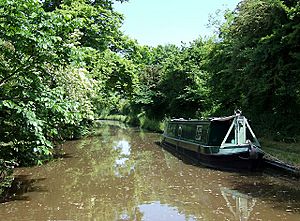
Schools in Bedworth
- Nicholas Chamberlaine School
- Ash Green School
Media and News
Radio Stations
You can listen to several local radio stations:
- BBC CWR: 94.8 FM
- Fosse 107: 107.9 FM
- Free Radio Coventry and Warwickshire: 97.0 FM
- Anker Radio: 1386 AM (serves the nearby George Eliot Hospital)
- BBC Radio Leicester: 104.9 FM
Newspapers
The main local newspapers are:
- The Nuneaton News: This paper covers north Warwickshire. It is published on weekdays. The Wednesday edition is free in Bedworth.
- The Nuneaton Telegraph: This is a local version of the Coventry Telegraph. It started in 1992.
- The Bedworth Local: This is a local business directory and news website.
TV News
Regional TV news for the Nuneaton area comes from:
- BBC (West) Midlands Today
- ITV News Central
Famous People from Bedworth
- Kyle Storer (born 1987), professional footballer.
- Jordan McFarlane-Archer (born 1993), professional footballer.
- Nona Bellairs (1824–1897), writer and helper of others.
- Chris Camwell (born 1998), professional footballer.
- Nicholas Chamberlaine (1632–1715), priest and generous helper.
- Pete Doherty, (born 1979) singer from the band The Libertines, went to Nicholas Chamberlaine School.
- Diane Elson, (born 1946) an expert in economics and society.
- Conrad Keely, (born 1972) from the American rock band ...And You Will Know Us by the Trail of Dead lived in Bedworth.
- Brian Locking, (1938–2020) musician, who was once a member of The Shadows.
- Nick Skelton, (born 1957) won a gold medal in the London 2012 Olympics for showjumping.
- Rev Richard Mudge (1718–1763), clergyman and composer, died here.
See also
 In Spanish: Bedworth para niños
In Spanish: Bedworth para niños
 | Dorothy Vaughan |
 | Charles Henry Turner |
 | Hildrus Poindexter |
 | Henry Cecil McBay |


